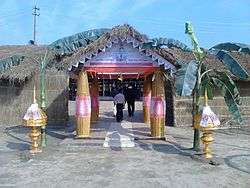Baresahariya Bhaona
| Barechahariya Bhaona | |
|---|---|
|
Entrance of Barechahariya Bhaona Mahotsav | |
| Status | Active |
| Genre | Hindu festival |
| Location(s) | Jamugurihat, Sonitpur, Assam |
| Country | India |
| Inaugurated | 1797-98 |
| Organized by | People of Jamugurihat |
| Website | |
| www.barechahariabhowna.com | |
Barechahariya Bhaona (Assamese: বাৰেচহৰীয়া ভাওনা) is a 200-year-old unique drama festival held every 5–6 years at Jamugurihat, a Small Town in Sonitpur District, Assam.[1] The festival was first held in 1797-98. The shrill command of the Gayan Bora followed by the unified sounds of Doba, Kanh, Bhortal& Khol will once againresonate amidst the audience to signal the start of the Barechaharia Bhaowna. This tradition will once again be reaffirmed and the festival dating back to two centuries will liven up the small town of Jamugurihat in Sonitpur District.
History has it that Barechaharia Bhaowna has traversed a long way of 213 years since its inception in 1797 AD at Jamugurihat. The convergence of religion and culture has given this festival the strong fabric to survive the forces of time while retaining its enduring and mesmerizing quality of storytelling. Normally the Bhaowna is a dramatization of stories from Ramayana, Mahabharata, Puranas etc. in a different style created by the Mahapurush Sankardev, the great vaishnavite saint, philosopher, reformer, poet, writer, dramatist etc. depicted with Bhakti Rasa in the form of different Raga & Tala. The main target of the saint was to unite the then diverse society with the spirit of entertainment and also to attract towards the vaishnavism preached by Him.The traditional Bhaowna is held in a Namghar, the traditional prayer house of a village unit called Khel and also in Sattras, a monastery like institution to promote the Sankari culture, founded by Sankardev.In the traditional Bhaowna there is always a group of musicians comprising Gayan & Bayan that is singer and drummer who begin the orchestra (Jora) in Sankari style followed by the entry of Sutradhar who recites slokas and narrates the entire story of the drama to be performed. The Director, here is known as Gayanbora commands other performers to make entryinto their own stage. Nam prasanga meanskirtana also is an integral part of the Bhaona. Brajabuli is used to script the dialogues.The concept of Barechaharia Bhaona is derived from the traditional Bhaona and in this festival, unlike other Bhaona it is performed by several teams. The Bhaona is performed simultaneously by teams from the different villages of the region on several stages by the holy altar in the center. It is of great pride to say that only materials used is the locally abundant bamboo, thatch, cane etc. with help from community workers from the locality. The unique design, the rudimentary materials used and the organization of labour may atfirst seem unfit for such a beautiful creation; however, it is something to sense and all of a sudden standing under the pandal which can fit 30,000 makes one think about the magnanimity of human motivation and dedication.It can be said without doubt that people who pour in from various corners of the region reaches several lakhs over the span of the Barechaharia Bhaona. The sea of population that surrounds the Bhaona pandal every day are of different caste, creed & community and the palpable senseof culture all around binds each and every one of them into one single thread of human kind.We hope the modern technology applied toprint and audio-visual media can do a lot for appraisal of this rare cultural show across the globe.
Article By- Abhijit...[2]
Notes
- ↑ TI Trade (2012-11-08). "The Assam Tribune Online". Assamtribune.com. Archived from the original on 2014-01-09. Retrieved 2013-02-25.
- ↑ "Dance-drama extravaganza in Assam with 2,500 actors". News.webindia123.com. 2007-04-01. Retrieved 2013-02-25.
References
- Sarma, Madan M.; Dutta, Parasmoni (2009), "Baresahariya Bhaona: Community Drama Festival of Assam: A Living Tradition", Asian Theatre Journal, 26 (2): 303–319, doi:10.1353/atj.0.0040
